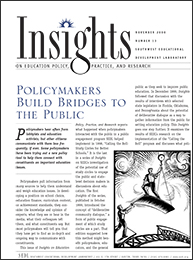Increased Civic Participation
In addition to the themes of information flow and relationship building, analyses of interviews with policymaker participants suggested two tentative findings that were beginning to emerge but were beyond the scope of this study. Some of the policymaker-respondents speculated that given an increase in information flow and stronger relationships with the public, constituent participation in community study circles might become the first step in public initiation or support of policy action. Interviews with the policymakers suggest that study circles have the potential to activate a new and broader constituency for public education by offering a process by which policymakers and the public can work together.
Activating a New, Broader Constituency for Public Education
As the public comes to understand the state policymaking arena and how policymakers do their work, the potential emerges for individual community members to become active advocates for school reform. A number of policymakers saw study circles as a useful format for promoting and enabling greater public participation in education because they gave citizens and legislators the opportunity to talk constructively about education issues. One policymaker remarked, "Just the dialogue has a lot. . . . If you can get the parents and the citizens involved, you accomplish an awful lot because you bring closer together the educational process and the people they are serving." Another policymaker elaborated, "The legislation we consider, for the most part, is not generated so much by the individual legislator but by the . . . wants, needs, or suggestions of their constituents or lobbyists or people with special interests. So if that type of . . . dialogue continues and the community gets involved then you will have more ideas coming to the legislature, many of which would be very good ideas [and] some of which would not be, but that is true in any situation."
Initiation or Support of Education Policy Action
While community dialogue in itself does not guarantee an increased level of public action in education, several policymakers were hopeful that it would shape a new and broader constituency into an active political force. Although SEDL did not try to pinpoint direct applications of study circles on state education policy action, some evidence suggests that interactions between policymakers and the public in these community deliberations did enter into policymakers’ thinking and actions. During the time that the study circles took place, policymakers generated new policy ideas with which to respond to the needs of schools and communities, and they increased or decreased support for initiatives that were already underway. Said one policymaker, "I’m going to have at least one education bill of my own that I’ll be running with, so I think when I discuss the issues or we talk about education, . . . I feel like I’ll be able to speak with a little more authority."
Next Page: Challenges to Policymakers' Satisfaction

